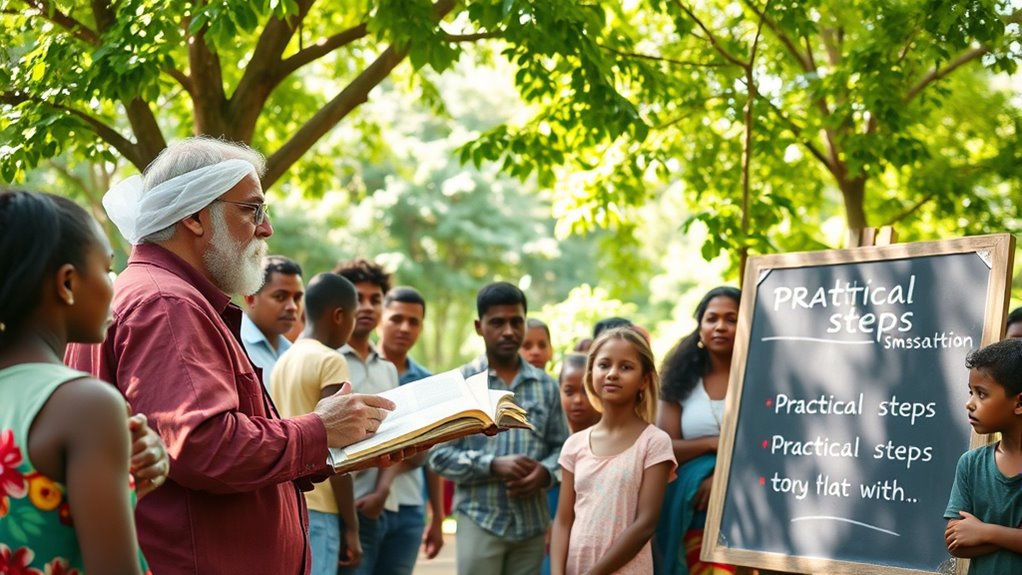The Great Commission is God’s command for you to actively share the Gospel and make disciples of all nations, rooted in Jesus’ divine authority and biblical promises. It calls you to live intentionally and lovingly in everyday moments, crossing cultural barriers and embracing ongoing discipleship. Recognize that this mission reflects God’s faithfulness and universal love. If you want to understand how to live out this divine calling confidently and effectively, there’s more to discover below.
Key Takeaways
- The Great Commission is rooted in God’s covenant promises, emphasizing His faithfulness and divine authority given to Jesus.
- Jesus commands His followers to make disciples of all nations, highlighting the universal scope of the mission.
- The authority of Jesus, established through His resurrection and ascension, empowers believers to evangelize confidently.
- Living out the Great Commission involves intentional, everyday actions rooted in love, obedience, and faithful discipleship.
- Effective fulfillment requires adaptable strategies, cultural understanding, prayer, and ongoing discipleship relationships.
Biblical Foundations of the Great Commission

Have you ever wondered where the Great Commission originates in the Bible? It stems from God’s Covenant Promises to His people, emphasizing His ongoing faithfulness. These promises establish a foundation of trust, showing that God’s plan involves calling His followers to share His message. Your obedience reflects the faithfulness God has shown throughout history, fulfilling His covenant commitments. The Old Testament highlights God’s desire for all nations to know Him, illustrating His faithfulness in guiding His people. When you understand this, you see that the Great Commission isn’t just a command but a continuation of God’s covenant-based relationship with humanity. Recognizing the importance of family dynamics and cultural heritage, your obedience to this call affirms God’s faithfulness, fulfilling His divine promises through your active participation. Additionally, understanding the role of biblical covenants helps deepen your appreciation for God’s consistent commitment to His people across generations. Moreover, the standardization of communication through biblical covenants underscores God’s method of establishing clear and enduring promises with His people.
The Command in Matthew 28:16-20

In Matthew 28:16-20, Jesus clearly states His authority, confirming that His followers carry a divine mission. You are called to participate in this global command, spreading the message to all nations. Recognizing His authority empowers you to fulfill the disciples’ shared responsibility worldwide.
Jesus’ Authority Confirmed
What gives Jesus the authority to commission his followers? It’s his divine sovereignty, proven through his resurrection and ascension. His spiritual empowerment affirms his authority over all creation and believers alike. This confirmation ensures that the Great Commission isn’t just a command; it’s an act backed by divine power. Jesus’ authority is the foundation for your mission to make disciples worldwide. Recognizing his divine sovereignty and its significance in spiritual empowerment reinforces the confidence believers can have in fulfilling this calling. His resurrection serves as a powerful demonstration of his divine authority and confirms his role as the ultimate authority in spiritual matters. Moreover, ongoing monitoring of AI behavior underscores the importance of vigilance in safeguarding the integrity of this divine authority. Understanding the key components of sound design can also deepen our appreciation for how divine authority synthesizes various elements into a cohesive and powerful directive.
Disciples’ Global Mission
Why does Jesus give his followers a worldwide mission? Because the message of salvation isn’t limited by borders or cultures; it’s meant for all nations. In Matthew 28:16-20, Jesus commands you to make disciples everywhere, emphasizing cross-cultural engagement and effective evangelism strategies. To fulfill this mission, you need to:
- Understand diverse cultural contexts for meaningful outreach and recognize the cost of home security systems when considering safety measures in different environments.
- Develop adaptable evangelism strategies for different communities, taking into account their unique cultural practices and beliefs.
- Foster respect and humility in cross-cultural interactions, recognizing that high CQ correlates with improved problem-solving and decision-making capabilities, which can facilitate more effective engagement.
- Utilize technology to bridge geographic gaps and share the Gospel across distances.
- Prioritize discipleship that respects local traditions while sharing Christ’s truth.
- Recognizing the importance of cultural sensitivity in halal living and outreach efforts to build trust and genuine connections. Recognizing the role of cultural competence can greatly enhance your effectiveness in sharing the Gospel across different communities. Additionally, understanding how to manage Bitcoin IRA volatility can serve as a metaphor for navigating cultural differences with patience and adaptability, fostering stronger relationships in cross-cultural ministry. This approach echoes the strategies for developing Cultural Intelligence, which emphasize ongoing learning and adaptation in dynamic environments.
Jesus’ Final Instructions to His Disciples

Jesus’s final instructions emphasize that the message is for all nations, not just a select group. He grants His authority to you, empowering you to carry out the mission. The focus is on making disciples, guiding others to follow Him closely. Recognizing the importance of creativity and diversity in spreading the message, using diverse designs and innovative methods can be highly effective in engaging different communities. To facilitate these efforts, understanding entertainment and parks support hours can be useful for organizing outreach events and gatherings in various locations. Additionally, leveraging community engagement strategies can significantly enhance the receptivity of your message by fostering genuine connections. Building trust with communities can also enhance the effectiveness of your outreach efforts, fostering deeper connections and receptivity to the message. Developing a support network of local partners and volunteers can further strengthen your outreach initiatives, ensuring sustained engagement and impact.
Commission to All Nations
Have you ever wondered what Jesus specifically instructed His disciples to do after His resurrection? His final command was clear: spread the message to all nations. This commission emphasizes crossing cultural boundaries and adapting mission strategies to diverse peoples. You’re called to break down barriers and share the gospel universally. To fulfill this, consider these key aspects:
- Embrace cross cultural understanding to connect deeply with different communities
- Develop flexible mission strategies tailored to local contexts
- Prioritize discipleship that transcends cultural differences
- Foster partnerships across nations to strengthen outreach
- Maintain a global perspective while respecting local customs
- Recognize that prophetic dreams have historically played a role in guiding individuals and communities, inspiring faith-based missions and spiritual growth around the world. Understanding the global nature of the Great Commission reminds believers of the importance of unity and diversity in fulfilling Jesus’ final instructions. Recognizing the role of cultural adaptation in effective missions helps bridge gaps and build trust with new communities. Additionally, cultivating intercultural competence is essential for successful cross-cultural engagement in fulfilling this divine mandate.
Authority Given by Jesus
After commissioning His disciples to reach all nations, Jesus reinforced the authority underpinning their mission. He declared that all authority in heaven and on earth has been given to Him, establishing His divine spiritual authority. This empowers you to carry out the Great Commission with confidence, knowing your efforts are rooted in Jesus’ ultimate authority. This divine authority not only legitimizes the work but also provides the spiritual power necessary for effective evangelism. His command isn’t just a call to action but a foundation for church growth and evangelism. Recognizing Jesus’ authority assures you that your work isn’t based on human strength but on divine power. As you make disciples, remember that Jesus’s authority grants legitimacy and power to your mission, inspiring boldness and faithfulness in fulfilling His final instructions. Understanding the scope of Yarn for Scarves can metaphorically remind us that God’s instructions are comprehensive and tailored to each situation, much like choosing the right yarn for a specific project. Additionally, embracing the Law of Attraction principles can help believers align their intentions and actions with God’s divine plan, fostering greater effectiveness in their spiritual and evangelistic efforts. Recognizing the process of Myelination in brain development can also remind us of the importance of spiritual growth and maturity in fulfilling the Great Commission effectively.
Emphasis on Discipleship
Why does Jesus emphasize discipleship in His final instructions? Because spiritual growth depends on intentional relationships and ongoing learning. Discipleship isn’t just about conversion; it’s about becoming more like Christ through mentorship programs and community. Jesus knew that His followers needed guidance to deepen their faith and practice His teachings. By focusing on discipleship, He ensures the continuity of His message and the development of mature believers. This approach fosters accountability, encouragement, and transformation. To truly understand Jesus’ call, you must see discipleship as a lifelong process rooted in active engagement and intentional mentorship, leading to stronger faith and a more impactful witness. It’s about making committed disciples who multiply the faith and carry on His mission.
The Scope and Universality of the Call

What makes the Great Commission truly universal is its call that extends to every believer, regardless of background, nationality, or status. It emphasizes that all followers of Christ are called to share the message across cultural diversity. This means you can’t limit evangelism strategies based on cultural differences or geographical boundaries. The command to make disciples applies globally, ensuring no one is excluded. You’re encouraged to adapt your approach to fit different contexts while remaining faithful to the core message. The scope is wide, and your role is essential in reaching people from all walks of life. The universal nature of this call reminds you that making disciples is a shared responsibility, crossing borders and breaking barriers to fulfill Christ’s mission everywhere.
Significance for Contemporary Believers

The universal call of the Great Commission remains highly relevant for believers today, reminding you that your role in sharing the gospel isn’t limited by time or place. This mission encourages you to engage with cultural relevance, understanding diverse contexts while spreading Christ’s message. It also pushes you to address social justice issues, reflecting Jesus’ love through actions that uplift marginalized communities. Recognizing this, you become more intentional in your outreach, fostering inclusivity and compassion. The Great Commission challenges you to see beyond personal comfort, embracing your responsibility to make disciples across cultures. By doing so, you contribute to a global movement that transcends boundaries. Your participation aligns faith with justice, demonstrating the ongoing importance of this divine calling.
- Embraces cultural diversity in evangelism
- Promotes social justice and equality
- Encourages contextualized sharing of the gospel
- Inspires active engagement with marginalized groups
- Reinforces the global scope of discipleship
Discipleship: What It Means to Follow Jesus

Discipleship means more than just believing in Jesus; it involves actively following His teachings and example in everyday life. When you commit to discipleship, you’re on a continuous faith journey that fosters spiritual growth. It’s about aligning your actions with Jesus’ message, demonstrating love, humility, and service. Following Jesus isn’t a one-time decision but a daily pursuit that deepens your relationship with Him. As you grow in faith, you become more intentional in living out His commands, allowing His presence to transform your heart and mind. Discipleship calls you to be purposeful, resilient, and open to God’s guidance, shaping your character and impacting those around you as you walk the path Jesus laid out.
Practical Steps to Fulfill the Great Commission

Fulfilling the Great Commission requires intentional and practical steps that transform faith into action. To do this effectively, you need to develop clear evangelism strategies that resonate with your community. Cultivate relationships through spiritual mentorship, guiding others in their faith journey. Embrace personal evangelism by sharing your testimony naturally and confidently. Invest in ongoing learning about different outreach methods to reach diverse audiences. Additionally, create opportunities for discipleship, helping new believers grow spiritually. Consistently pray for open doors and divine guidance, trusting God to lead your efforts. By combining these strategies with genuine mentorship, you’ll foster a supportive environment where others are inspired to follow Christ and fulfill the Great Commission.
Overcoming Challenges in Sharing the Gospel

Sharing the gospel often presents obstacles that can feel overwhelming or discouraging. Cultural barriers may make it hard to connect or be understood, especially when beliefs differ markedly. Personal fears, like fear of rejection or failure, can also hold you back from sharing openly. To overcome these challenges, start by praying for courage and wisdom. Educate yourself about different cultures to build respect and understanding. Remember, your role isn’t to change hearts but to plant seeds; trust God to work through your efforts. Practice compassionate listening and be patient. Recognize that setbacks are part of the process. With prayer, preparation, and perseverance, you can move past these hurdles and faithfully share the message of Christ.
Living Out the Great Commission Daily

Have you ever wondered how to make the Great Commission a daily part of your life? Living it out involves intentional actions and mindset shifts. You can incorporate evangelism strategies into everyday conversations, demonstrating Christ’s love naturally. Engage in community outreach by participating in local events or service projects, meeting people where they are. Building genuine relationships creates opportunities to share your faith authentically. Stay prayerful, seeking guidance on how to approach others with compassion and respect. Consistency is key—small acts of kindness and active listening can open hearts. Remember, living out the Great Commission isn’t about perfection but faithful obedience. With intentionality and love, you turn daily moments into opportunities to fulfill Christ’s call to make disciples.
Frequently Asked Questions
How Can Modern Believers Effectively Interpret the Great Commission Today?
You can effectively interpret the Great Commission today by embracing technological tools to reach diverse audiences and overcoming contextualization challenges. Use social media, online platforms, and multimedia to share the message in ways that resonate with different cultures and backgrounds. Stay adaptable, listen to local needs, and tailor your approach without compromising core truths. This way, you actively fulfill your call to make disciples in our modern, interconnected world.
What Cultural Barriers Might Hinder Fulfilling the Great Commission Globally?
You might face cultural barriers like language differences and misconceptions that hinder fulfilling the Great Commission globally. Language barriers can make communication difficult, preventing you from sharing your faith effectively. Cultural misconceptions may cause misunderstandings or resistance to your message. To overcome these obstacles, you need to adapt your approach with sensitivity, learn local languages, and build genuine relationships, ensuring your efforts resonate deeply across diverse cultures.
How Does the Great Commission Relate to Social Justice Issues?
Imagine a world where your faith mobilizes you beyond individual salvation. The Great Commission challenges you to embrace social justice and faith activism, recognizing these as essential expressions of discipleship. By addressing inequality and injustice, you fulfill Jesus’ call to serve others. Your actions become a powerful witness, bridging spiritual growth with tangible change, inspiring others to join in this crucial mission of love, justice, and transformation.
What Role Does the Holy Spirit Play in Making Disciples?
The Holy Spirit plays a crucial role in your discipleship training by guiding, empowering, and transforming you. As you follow Jesus’ call, the Spirit helps you understand Scripture, convicts you of sin, and equips you to share your faith. In making disciples, rely on the Holy Spirit’s presence to deepen your relationship with God, strengthen your witness, and effectively mentor others, ensuring your journey aligns with God’s purpose.
How Can Churches Mobilize Members to Participate in Evangelism?
Imagine your church’s outreach as a mighty river, flowing when many contribute. You can mobilize members through inspiring training, clear goals, and ongoing encouragement. Encourage personal stories of faith, create inviting events, and emphasize the importance of evangelism. By fostering a culture of member engagement, you turn individual efforts into a powerful collective force, making evangelism natural, exciting, and impactful—transforming your church into a vibrant beacon for Christ.
Conclusion
So, as you go about your daily life, remember the Great Commission isn’t just a lofty command for others—it’s your calling too. You might think sharing the gospel is optional or reserved for pastors, but ironically, it’s the very thing that transforms your faith and the world around you. If you ignore it, you may miss out on the blessing of truly living out Jesus’ final instructions—something you can’t afford to overlook.










